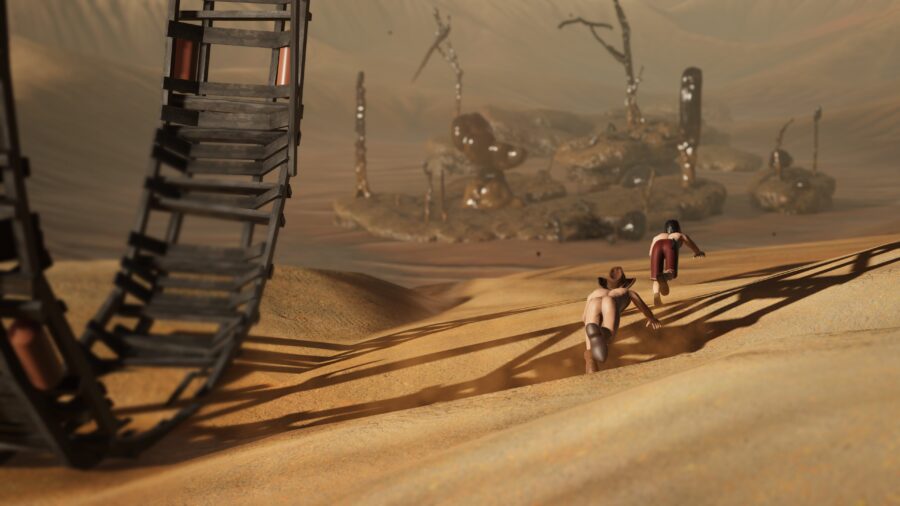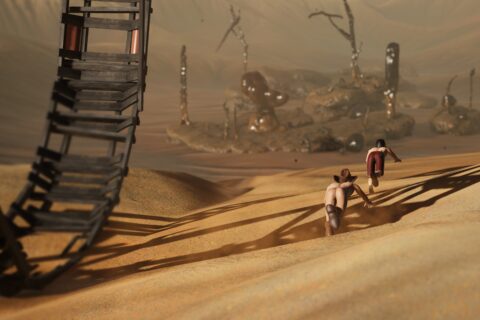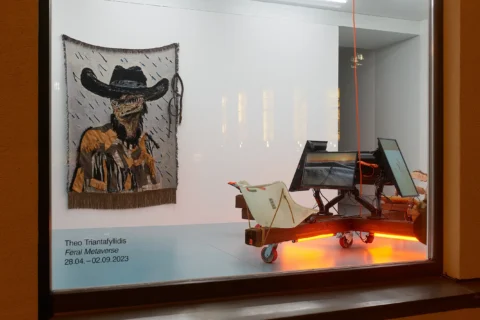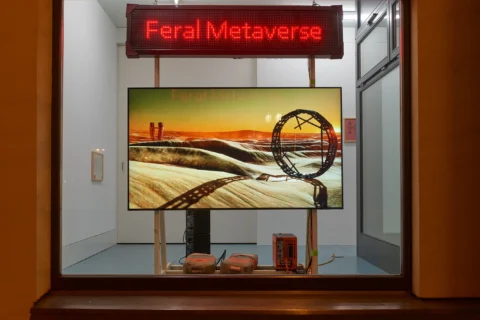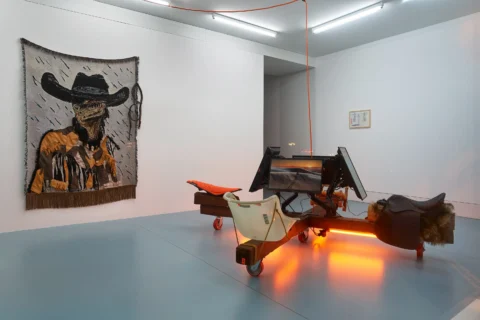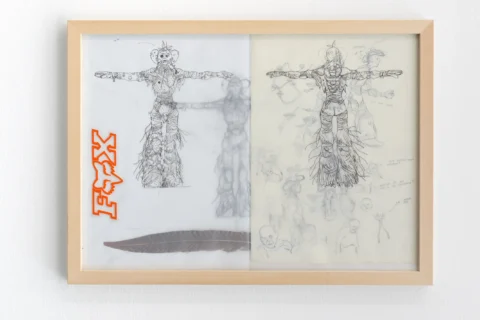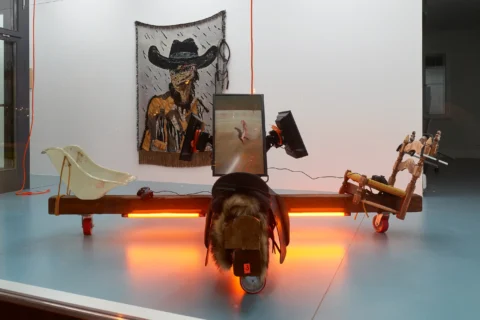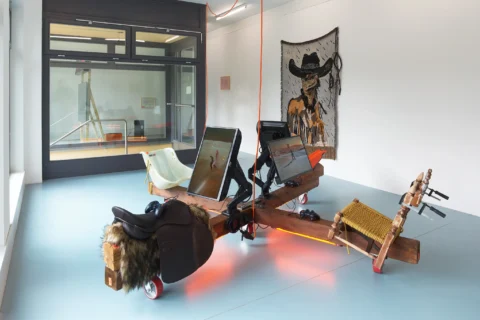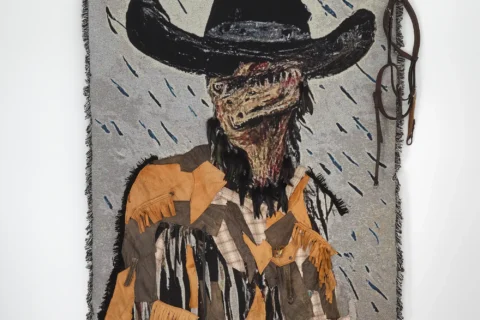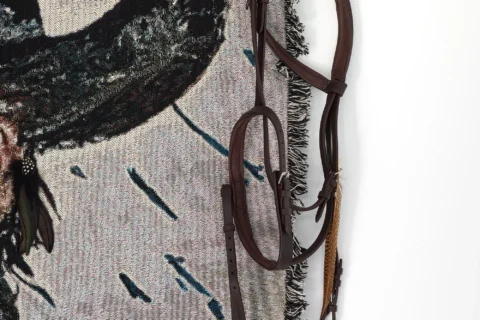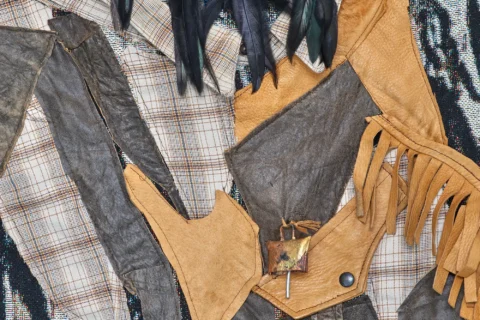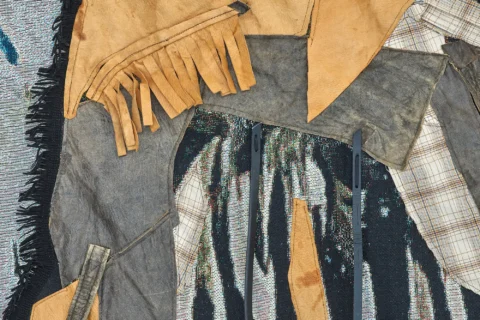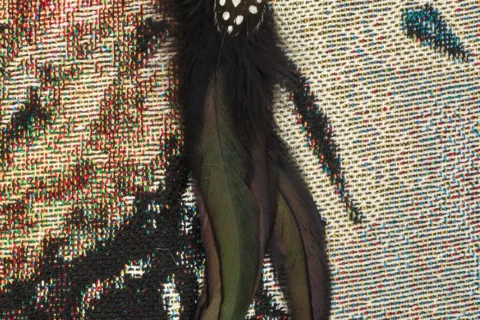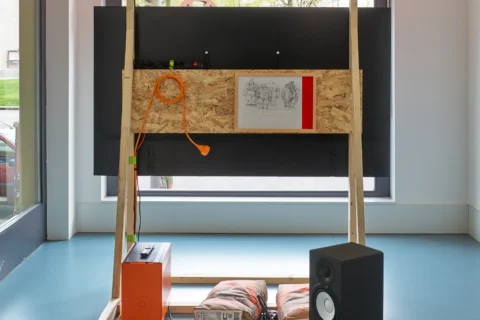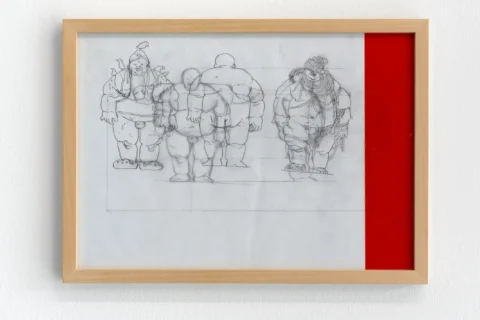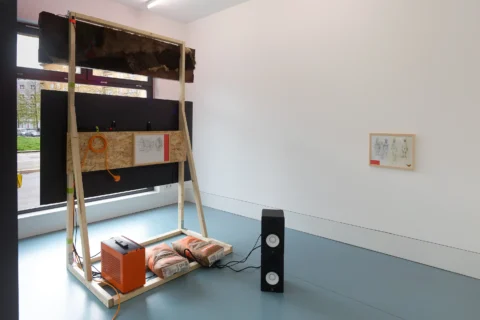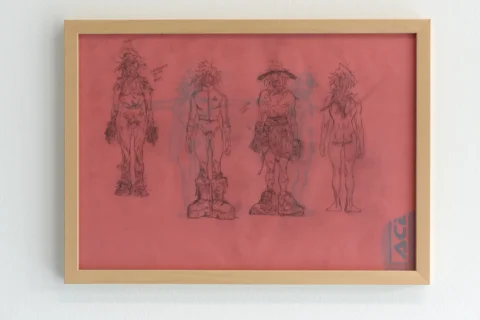Theo Triantafyllidis Feral Metaverse
29/04/2023 – 02/09/2023
Crypto Kiosk
Rosa-Luxemburg-Straße 33
10178 Berlin
Opening / Eröffnung:
Freitag, 28. April 2023, 18 – 21 Uhr
Friday, April 28, 2023, 6 – 9pm
Öffnungszeiten / Opening hours:
Dienstag - Freitag 11 - 18 Uhr, Samstag 12 – 18 Uhr
Tuesday - Friday 11am - 6pm, Saturday 12 – 6pm
Besondere Öffnungszeiten während des Berlin Gallery Weekends /
Special Opening hours during Berlin Gallery Weekend:
Samstag, 29. April 2023, 11 – 19 Uhr, Saturday, April 29, 2023, 11am – 7pm
Sonntag, 30. April 2023, 11 – 18 Uhr, Sunday, April 30, 2023, 11am – 6pm
Press Release
Unrestricted Straying
A crawling, a stumbling, a gesturing – a crying, pointing, punching humanoid. You enter the game as a naked avatar. Equipped with neither tools nor language, you fall into a landscape full of abstraction and finite emptiness. There you can discover the workings of your control and set small markers. For in the sea of ash and sand, between irregular waves and hills, there are no roads, no houses, no borders. As an anthropomorphic being, you can hardly escape from the barren, mountainous foreground.
Upon entering the World, players are dropped on a random location.
The World feels vast, tactile and muddy.
But also pleasant, bucolic and dreamlike.
The World is large, without many discernible features.
Navigation is hard. Players are sparsely placed and hard to find.[1]
A scenario that could remind one of the dark landscapes of Pieter Bruegel[2], who also placed dancing and suffering figures under a sky colored dark by the smoke of burning earth. The ochre play of light meets some weirdly shiny sculpture-like stones in valleys, forming a relational place in a landscape that otherwise lacks moisture. Various references are examined to break with binaries. Between dystopia and utopia, real and imaginary, purgatory and waiting room, self and world. As a player, the visitor activates, in addition to the constitutive-observational position, his relational acting position, which can create practical sense in the (meta-)game. As we navigate the Anthropocene, the era of human-induced catastrophe, persuasive arguments for embracing the weird can prompt a reevaluation of our connections to nature. Moreover, they can inspire us to take greater responsibility for one another, even when faced with entrenched institutional inertia, as inspiringly portrayed in works like Elvia Wilk’s Death by Landscape[3].
In the game’s microcosm and amidst its nightmare-like shimmering, mysterious, and grotesquely comic images, a search for recognition and mutual understanding follows. In order to overcome the voiceless situation, characters translate their needs into wild gestures and forms, as far as the structure of the game allows them to do so. Translation is, according to English author and poet John Berger, not a binary matter between two languages, but a triangular one. “True translation demands a return to the preverbal.”[4] This way one can achieve the vision or experiences that gave rise to the word. Communication is a body, a living creature and “this creature’s home is the inarticulate as well as the articulate”[5]. Players in the Feral Metaverse find themselves in a sort of Babylonian confusion of tongues, which appears not as divine punishment, but potential liberation. The Prologue episode proposes an online mode of communication that is primitive, nonverbal, improvisational, communal and hopefully freeing. After overcoming the urge to bury the head in the sand like an ostrich, one will need to find its way with fellow players.
The Goal of the Game is never communicated to the Players.
The Goal of the Game is for Players to achieve Togetherness.
The World responds to Players collective actions in structural ways.
If Players Fail, they are exterminated.
A new set of Players is introduced.[6]
This feralization of a Metaverse is an endeavor and artistic response to counterbalance Mark Zuckerberg’s vision of an extensively monitored and highly productive virtual realm. The Feral Metaverse is a place without initial capitalist conditions, where there is no personal possession or inventory.
The Primitivist ideology, rooted in the Paleolithic epoch prior to the emergence of domestication and agriculture, asserts that the constraints of civilization were superfluous in the wilderness, where humans were inherently benevolent and compassionate. John Zerzan[7], US-American ecophilosopher and media artist, contends that time and technology are not impartial scientific constructs, and he ascribes to computers and the internet a disintegrating impact that requires a perpetual demand for greater efficiency and leisure time from society. Rather, our goal should be a lifestyle marked by relaxation, interconnectedness with the natural world, sensuous sagacity, sexual parity, and well-being.
For his debut exhibition at Galerie Nagel Draxler, Theo Triantafyllidis showcases the first prototype of his new multiplayer game Feral Metaverse: Prologue can be ventured by a quartet of players via the sculptural installation, the Feral Metaverse: 4 Player Rig, created by the artist. The installation boasts a cross-shaped seating arrangement on casters, incorporating a leather saddle, wooden chair, go-kart, and motorcycle seat stationed before both horizontal and vertical screens. The interplay between physical and virtual space’s spatial configuration, which mirrors the collaborative yet potentially adversarial dynamics of the game. While players must work together to participate, the structure’s mobility also opens up the possibility for playful sabotage. Visually, the installation is linked to the virtual realm through the use of vibrant orange installation cables, which serve as a conduit between the two spaces. The exhibition showcases a tapestry composed of denim, leather strips, and chicken feathers in the form of a Self Portrait (Reptilian Cowboy) by Theo Triantafyllidis. In addition, a set of drawings and sketches beautifully unveil the character concepts from both Triantafyllidis and Connor Willumsen. A customLED display exhibits the Feral Metaverse Manifesto, which details the game’s rules in eight points, but with no guidance provided. Additionally, the Crypto Kiosk offers insight into the game’s potential answers to questions about game feel, mechanics, and narratives. For the four month duration the artist will use Crypto Kiosk as the game's headquarters and continue the development of the game as well as a series of public facing events around the exhibition.
Text: Maja Funke
_
Triantafyllidis (*1988 in Athens, lives and works in Los Angeles and Athens) is an artist working with digital and physical media to explore the experience of space and the mechanics of embodiment in hybrid realities. Utilizing algorithms and game engines, virtual reality headsets and experimental performance processes, he creates interactions within immersive environments. In Triantafyllidis’s worlds awkward interactions and precarious physics mingle with uncanny, absurd and poetic situations, inviting the viewer to engage with new realities. Through the lens of monster theory, he investigates themes of isolation, sexuality and violence in their visceral extremities. He offers computational humor and AI improvisation as a response to the tech industry’s agenda. He tries to give back to the online and gaming communities that he considers both the inspiration and context for his work by remaining an active participant and contributor. The artist holds an MFA from UCLA, Design Media Arts and a Diploma of Architecture from the National Technical University of Athens. Currently his work is part of Game Design Today at ZHDK Museum für Gestaltung, Zurich and Worldbuilding: Gaming and Art at Julia Stoschek Foundation in Dusseldorf as well as at Centre Pompidou-Metz. He has shown work in museums, including House of Electronic Arts in Basel, Hammer Museum in Los Angeles and NRW Forum in Dusseldorf. He was part of the 2021 Athens Biennale: Eclipse, Berliner Festspiele 2021, Sundance New Frontier 2020 and Hyper Pavilion in the 2017 Venice Biennale.
[1] Theo Triantafyllidis: Feral Metaverse Manifesto, 2023.
[2] Pieter Bruegel the Elder: The (Great) Tower of Babel, c. 1563; The Triumph of Death, c. 1562.
[3] Elvia Wilk: Death by Landscape, Essays. Soft Skull Press, 2022.
[4] John Berger: Writing is an off-shoot of something deeper. In: The Guardian, December 2014.
[5] Ibid.
[6] Theo Triantafyllidis: Feral Metaverse Manifesto, 2023.
[7] John Zerzan: Future primitive and other essays. Brooklyn, N.Y.: Autonomedia, 1994.
